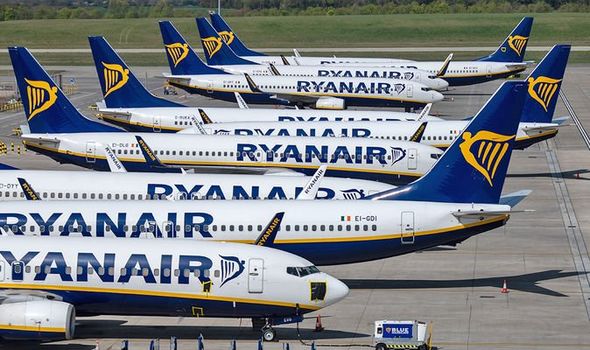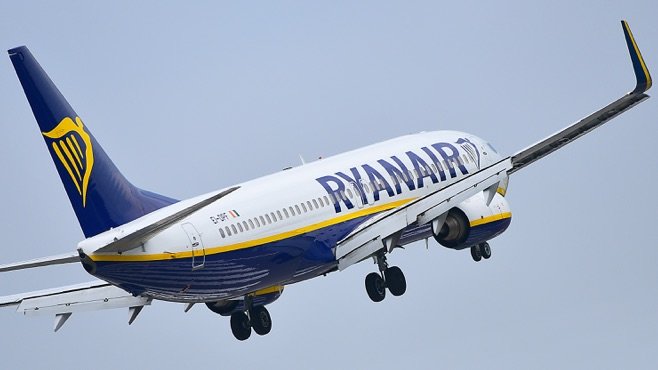Low-cost airline Ryanair on Monday posted an H1 loss of €197 mln, compared to a 2019 first-half profit of €1.15 bln due to the impact of coronavirus with 99% of its fleet grounded from mid-March to end June.
Passenger traffic for the first six months also fell 80% from 86 million to 17 million.
| H1 (IFRS) – Group* | 30 Sep. 2019 | 30 Sep. 2020 | Change |
| Customers | 85.7m | 17.1m | -80% |
| Load Factor | 96% | 72% | -24pts |
| Revenue | €5.39bn | €1.18bn | -78% |
| Op. Costs | €4.10bn | €1.35bn | -67% |
| PAT/(Net Loss) | €1.15bn | (€197m) | n/m |
* excl. €214m except. hedge ineffectiveness charge.
COVID-19:
Covid-19 grounded the Group’s entire fleet from mid-March to the end of June as EU governments-imposed flight or travel bans and widespread population lockdowns. During this crisis, Group airlines repatriated customers and operated rescue flights for many EU Govts.
Passenger confidence and forward bookings into winter were negatively impacted by the return of EU government flight restrictions in September-October which heavily curtailed travel to/from much of Central Europe, the UK, Ireland, Austria, Belgium and Portugal.
As a result, Ryanair recently cut its FY21 traffic guidance to around 38 million guests. This takes the Group’s November-March capacity down from the previously guided 60% to at most 40% of prior year traffic.
The Covid-19 crisis has already caused the closure of a number of EU airlines including Flybe, Germanwings and Level as well as deep long-term capacity reductions at many others.
“We expect intra-European air travel capacity to remain subdued for the next few years. This will create opportunities for Ryanair to grow its network, and expand its fleet, to take advantage of lower-cost airport and aircraft opportunities that will inevitably arise,” said the airline.
Revenue & Costs
Revenue fell by 78% to €1.18 bln as traffic fell 80% to 17.1m. With almost zero Q1 traffic, the vast majority of H1 revenue was earned in Q2. Ancillary revenue performed strongly as more guests chose priority boarding and reserved seating.
The Group has agreed on staff pay cuts which helped minimise job losses.
“Our Route Development teams are working with airports partners across Europe who have suffered steep traffic declines and discussions are ongoing with aircraft suppliers to amend pricing to reflect the new Covid-19 reality.”
Due to significantly reduced winter traffic forecasts and ongoing aircraft delivery delays, the Group recorded a €214 mln ineffectiveness charge on fuel and currency hedges in H1.
Balance Sheet & Liquidity
Ryanair said its balance sheet is one of the strongest in the industry with a BBB credit rating (S&P and Fitch) and over €4.5 bln cash at 30 September.
Almost 80% of the Group’s fleet is unencumbered (with a book value of over €7 bln). Since March, the Group lowered cash burn by cutting costs, participating in EU payroll support schemes, cancelling share buybacks and deferring non-essential capex.
In September, the Group raised €400 mln of equity and a 5-year (unsecured) €850 mln Eurobond with a 2.875% coupon (both transactions were multiple times oversubscribed and keenly priced).
Cash was also boosted by €250 mln supplier reimbursements received in Q2.
“This ensures that the Group is well-financed to deal with the Covid-19 crisis and removes refinancing risk as it prepares to repay maturing debt over the coming year.”
Boeing MAX update
It is over 18-months since the Group was due to take delivery of its first Boeing 737-MAX-200 aircraft. Boeing expects a calendar Q4 return to service for the MAX-8, allowing Ryanair to, hopefully, accept delivery of its first MAX-200 in early 2021.
“We expect to take delivery of approximately 30 MAXs before peak Summer 2021,” said Ryanair.
It remains “committed to the Boeing 737, particularly the new 200 series “gamechanger” aircraft which have 4% more seats, 16% lower fuel burn and 40% lower noise emissions.
“These new aircraft will enable Ryanair to grow to 200m passengers p.a. over the next 5 or 6 years while lowering the cost base and significantly reducing its environmental footprint. “
OUTLOOK:
Ryanair said FY21 will continue to be a “hugely challenging” year given the current Covid-19 uncertainty.
The Group expects to carry 38 mln passengers in FY21.
“Although this guidance could be further revised downwards if EU governments continue to mismanage air travel and impose more uncoordinated travel restrictions or lockdowns this winter. The Group expects to record higher losses in H2 than in H1.”










